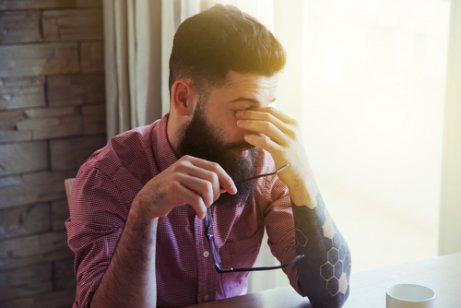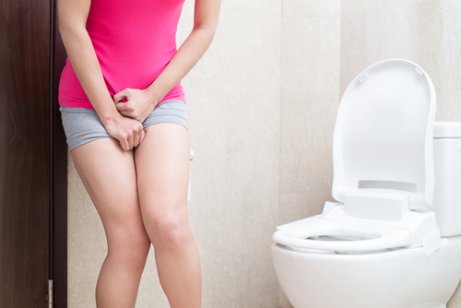Nocturnal Polyuria and Its Treatment

Nocturnal polyuria is a disease that interrupts nighttime sleep due to an urge to urinate. It makes you go to the bathroom more at night than during the day.
The urge to urinate increases as you get older, and it happens in both men and women. Several several causes can trigger this.
If the patient gets up more than twice at night, it can become a problem. Nocturnal polyuria can start to have a negative effect on daily activities, thus affecting the person’s quality of life.
Causes of nocturnal polyuria

There are a few different things that can cause this issue. First, drinking liquid in the late afternoon, or drinking coffee or alcohol after dinner can lead to nocturia.
On the other hand, urinary tract infections can also increase urination at night. Also, having high levels of calcium in the blood or taking medications like diuretics can cause it.
There are other conditions that may cause this disease. For example, some of them are:
- Poorly controlled diabetes
- Insipid or gestational diabetes
- Heart failure
- Edema in the lower extremities
- Sleep problems or conditions, like sleep apnea
- Certain medications
Diagnosing nocturnal polyuria
If you think you have nocturnal polyuria, and to help the doctor make an accurate diagnosis, it’s a good idea to keep a record of when you empty your bladder.
For two days, you need to record the amount of fluids you drink, the number of times you go to the bathroom, the amount of urine you produce, the medications you take, any urinary tract infections, and any related symptoms.
Then, the doctor will review it to figure out the causes and the best treatment for each individual patient. In addition, your doctor might order a urine test to examine the urine and see if there are any conditions causing the disease.
Symptoms

Another symptom of this condition is polyuria at night and during the day. Your body generates more than 2 liters of urine while you sleep. Daytime polyuria is the same, but just during the day.
Also, you might produce more urine at night than your body can hold, which means the body will have to eliminate some at night.
Check this out: Treatment for Nighttime Bedwetting or Involuntary Urination
Can you prevent nocturnal polyuria?
The World Health Organization (WHO) recommends a series of preventative measures. Some of them are closely related to the causes of this disease:
- Try to avoid drinking a lot in the afternoon. Also, avoid alcohol and stimulants.
- Urinate frequently, especially during the day and before bedtime.
- Eat lots of vegetables, fruits, legumes, soy and derivatives. However, eat less red meat, saturated fat, salt, sugar and calcium.
- Lie down flat after eating.
- Avoid long trips, constipation and humidity.
- Do physical exercise.
- Avoid being overweight.
You might be interested in reading: What Happens When You Resist the Urge to Pee?
Treatment options

If you think you might have nocturia, you should go to the doctor. He can refer you to a urologist, if necessary. The treatment will depend on the causes.
Treatment options for this disease may include different pharmacological interventions or treatments. For medications, some measures to take into account are:
- If you’re currently under treatment with diuretic drugs, take them 6 hours before going to bed
- Take a nap in the middle of the afternoon
- Put your legs up
- Wear compression stockings – in fact, they can help to prevent fluid buildup.
On the other hand, pharmacological treatment will consist of taking anticholinergic drugs. These medications may reduce the symptoms of an overactive bladder.
Also, some diuretics can help regulate urine output. Finally, other drugs like desmopressin help the kidneys make less urine.
All cited sources were thoroughly reviewed by our team to ensure their quality, reliability, currency, and validity. The bibliography of this article was considered reliable and of academic or scientific accuracy.
- Lane, T. (2016). Nocturia. Surgery (United Kingdom). https://doi.org/10.1016/j.mpsur.2016.04.004
- Kurtzman, J. T., Bergman, A. M., & Weiss, J. P. (2016). Nocturia in women. Current Opinion in Urology. https://doi.org/10.1097/MOU.0000000000000287
- Ancoli-Israel, S., Bliwise, D. L., & Nørgaard, J. P. (2011). The effect of nocturia on sleep. Sleep Medicine Reviews. https://doi.org/10.1016/j.smrv.2010.03.002
- Madhu, C., Coyne, K., Hashim, H., Chapple, C., Milsom, I., & Kopp, Z. (2015). Nocturia: Risk factors and associated comorbidities; Findings from the EpiLUTS study. International Journal of Clinical Practice. https://doi.org/10.1111/ijcp.12727
- Nishizawa, O. (2010). Clinical guidelines for nocturia. International Journal of Urology. https://doi.org/10.1111/j.1442-2042.2010.02527.x
This text is provided for informational purposes only and does not replace consultation with a professional. If in doubt, consult your specialist.








